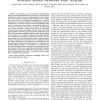Free Online Productivity Tools
i2Speak
i2Symbol
i2OCR
iTex2Img
iWeb2Print
iWeb2Shot
i2Type
iPdf2Split
iPdf2Merge
i2Bopomofo
i2Arabic
i2Style
i2Image
i2PDF
iLatex2Rtf
Sci2ools
TON
2010
2010
Minimizing delay and maximizing lifetime for wireless sensor networks with anycast
—In this paper, we are interested in minimizing the delay and maximizing the lifetime of event-driven wireless sensor networks, for which events occur infrequently. In such systems, most of the energy is consumed when the radios are on, waiting for an arrival to occur. Sleep-wake scheduling is an effective mechanism to prolong the lifetime of these energy-constrained wireless sensor networks. However, sleep-wake scheduling could result in substantial delays because a transmitting node needs to wait for its next-hop relay node to wake up. An interesting line of work attempts to reduce these delays by developing “anycast”-based packet forwarding schemes, where each node opportunistically forwards a packet to the first neighboring node that wakes up among multiple candidate nodes. In this paper, we first study how to optimize the anycast forwarding schemes for minimizing the expected packet-delivery delays from the sensor nodes to the sink. Based on this result, we then provide a ...
Related Content
| Added | 31 Jan 2011 |
| Updated | 08 Dec 2013 |
| Type | Journal |
| Year | 2010 |
| Where | TON |
| Authors | Joohwan Kim, Xiaojun Lin, Ness B. Shroff, Prasun Sinha |
Comments (0)

